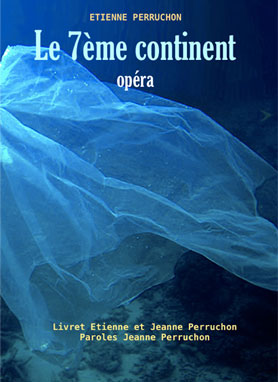The 7th continent
Opéra
This work was the subject of an order of Oct'opus for the students of CHAM from Saint-Nazaire
Created at the Théâtre de Saint-Nazaire from 17 to 20 May 2017. With : L'Orchestre et Chœur des classes CHAM de Saint-Nazaire, le Chœur de l'Alunéa, Marc Augé (le maire), Martin Barigault (Tristan), Ombeline Guetny (Lola) et Fabrice Morin (Ulysse). Conductor Yann Le Néchet. Choir dirctor Florence Cousin. Staging Loïc Auffret and Delphine Lamand.
Duration: 1h45
Booklet: Etienne and Jeanne Perruchon
Lyrics: Jeanne Perruchon
French language
Orchestration: 2 flutes (1 playing piccolo and soprano recorder), 2 oboes (including 1 playing English horn), 2 bb clarinets (including 1 playing the bass clarinet), 2 bassoons (1 playing the double bassoon) , 3 drums, 3 bb trumpets, 2 trombones, 1 tuba, Timpani, Percussion (Drum kit, snare drum, shocked cymbals, live cymbal, basque drum, xylophone, tube bells, glockenspiel, triangle, Drums, violas, chimes), Harp (1 or 2), Violins 1, Violins 2, Violas, Cellos, Double basses (4 or 5 strings)
Stage Orchestra: Bagad (Celtic bombers, bagpipes and celtic snare drum)

Caracters
Ulysse (baritone): Former retired ship captain. Lives near the shipyard. Is haunted by his dreams and hallucinations.
Lola (Soprano or Mezzo-soprano): Daughter of a fisherman sailor. She knows mysterious songs that she learned from a troupe of nomadic artists.
Tristan (Alto or Tenor): Gifted boy. He is part of the crew of scientists and ecologists. He invented a chemical way to recycle plastics into fuel.
The Mayor (Tenor): It is he who gives the inaugural speech. It must ensure the social organization of the passengers.
Children's Fishermen (Children's Choir)
Passengers - Workers and their Wives (Mixed Choir)
The story
In the 1990s, in Penhoët.
Inaugurated with great pomp the "Alunéa", the new ship whose construction has just been completed. That evening, the equinoctial tides are particularly strong and violent. While all the guests and official figures are on the boat for the party, a tidal wave completely submerges the port and carries the Alunéa which drifts in the darkness. Thus, like Noah on his ark, the mayor, Ulysses the retired captain in retirement, the young Lola fisherman daughter, children and adults, find themselves isolated from the world.
They will have to learn to live together. They will have to find survival solutions, try to bring the ship back to shore. In saving the young Tristan, miraculously survivors of a mysterious shipwreck, passengers do not imagine that their salvation will come when they have reached ... the 7th continent.
Notes of intent
An ecologist and humanist opera
Wanting to compose and write a modern opera with a sea context, how could we do otherwise than to propose a deeply ecological subject? Contemporary heroes are no longer kings, warriors or gods, but those who are crusading for the good of the planet and humanity. Those who, at all ages, in all social categories, decide to put their know-how, knowledge, art and even their lives at the service of great causes. Serving others.
Recently, we discovered the existence of what was named "the 7th continent": gigantic heaps of plastic waste in the oceans. Rejections of our consumption. And the many tidal waves and tsunamis around the world, due to global warming, are now among the major concerns of many countries. Also, the coasts disappear from the coast much faster than what had been diagnosed.
These three elements were a good basis for an opera libretto. We could put in it what we wanted for a lyrical work: a drama, ordinary heroes, dreams. A contemporary subject and a happy ending.
In the story that we have imagined we meet the reality of situations, the poetry of fiction and a drama. The characters, real, will be led to live an adventure worthy of the great stories of Jules Vernes. Realism and dreams are mingled, allowing us to transport ourselves into intense and unexpected emotional states. In our history, this improbable "Noah's Ark" allows us to talk about tolerance, solidarity and harmony. The protagonists must find out how to survive together. On the ship in distress, life together is to be reinvented.
Unlike many romantic operas, where death and drama come to conclude the work, our "7th continent" ends in a happy outcome where the protagonists are saved. When man displays imagination, generosity and perseverance, he can quite change the course of things and turn a distress into happiness. An error in success.
By imagining that a scientific intelligence can make it possible to transform waste into clean energy, we wanted to tell as a testimony that humanity has in it the forces of its salvation. Man can save himself. In saving the sea he saves himself, and in saving himself he saves the sea.
If in our history this is fictional, we have relied on real experiences and facts.
Yes, mushrooms can provide unsuspected solutions for recycling waste.
Similarly, a famous brand now manufactures clothes with fibers made of 40% recycled plastic recovered in the oceans.
A 19-year-old man invented a vessel that would permanently clean the oceans of plastic waste.
That is why our work ends with a cry of hope. A cry of hope carried by the magic of music. Perhaps the future belongs to those who know how to view utopias in the face.
Etienne and Jeanne Perruchon
Back to the list